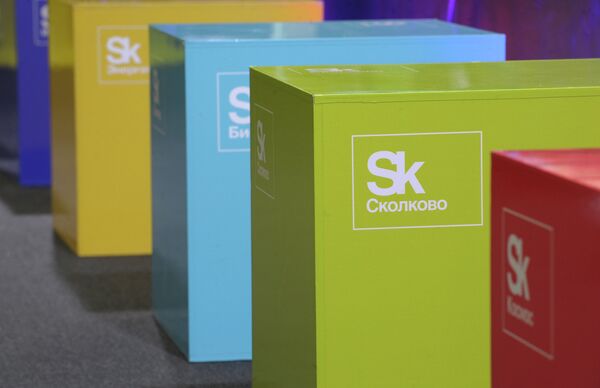MOSCOW, August 2 (RIA Novosti) – The Russian government appeared to renew its support for the Skolkovo innovation hub Thursday as Economic Development Minister Alexei Ulyukayev told the Cabinet that the embattled project would be included in a state program and receive 502 billion rubles ($15.2 billion) of funding through 2020.
The brainchild of Prime Minister Dmitry Medvedev and intended to emulate California's Silicon Valley, Skolkovo has been rocked this year by a series of corruption allegations, and reports that its state financing was being cut back.
The funding plan announced Thursday will be provided to Skolkovo under a state program called the “Creation and Development of the Skolkovo Innovation Center,” which is part of a broader state program, “Economic Development and the Innovation Economy,” according to Ulyukayev, the Prime News Agency reported.
The president of the Skolkovo Foundation and the public face of the project, billionaire Viktor Vekselberg, said that the government’s decision was an important moment.
“With a bit of daring we could call this day historic,” Vekselberg said, Russian media reported. "It is belief in the future of of the Skolkovo project."
Despite the financial commitment from the Cabinet, however, the amount of state money provided to Skolkovo is set to gradually fall in coming years. At a peak in 2012, the project received 26.6 billion rubles ($803 million), but this is set to decline to 9.9 billion ($299 million) by 2015, according to estimates by Vedomosti newspaper.
About one quarter of the 502 billion rubles of investment for Skolkovo over the next eight years announced Thursday will be contributed from the state budget, while 366.4 billion rubles will come directly from the private sector, said Ulyukayev, according to the Prime news agency.
Andrei Fursenko, the government's Skolkovo curator, told a panel discussion at the St. Petersburg Economic Forum in June that state largesse breeds laziness. “Budget money is too accessible,” he said. “There is no motivation to fight for more difficult, private money.
Medvedev also said Thursday that Skolkovo’s focus should remain firmly on Russia. “This [innovation system] cannot be international,” he said during the Cabinet meeting. “Of course it should be based on the achievements of all humanity… but it should, even so, be tailored to the Russian Federation.”
Investigations opened two criminal cases into senior Skolkovo executives in February over the alleged embezzlement of $800,000. And in April the Investigative Committee alleged that the Skolkovo Foundation had illegally paid $750,000 to opposition State Duma deputy Ilya Ponomaryov. Vekselberg was questioned over the corruption allegations in May.
Skolkovo also lost its official curator, and one of its most powerful supporters, Vladislav Surkov when he stepped down as deputy prime minister on May 8. The following month Vedomosti reported that President Putin had signed an order releasing state-owned companies from an obligation to provide Skolkovo with financial support.
The corruption scandals, financial problems and Surkov’s departure were widely interpreted by experts as signs that political support for the Skolkovo was fading.


